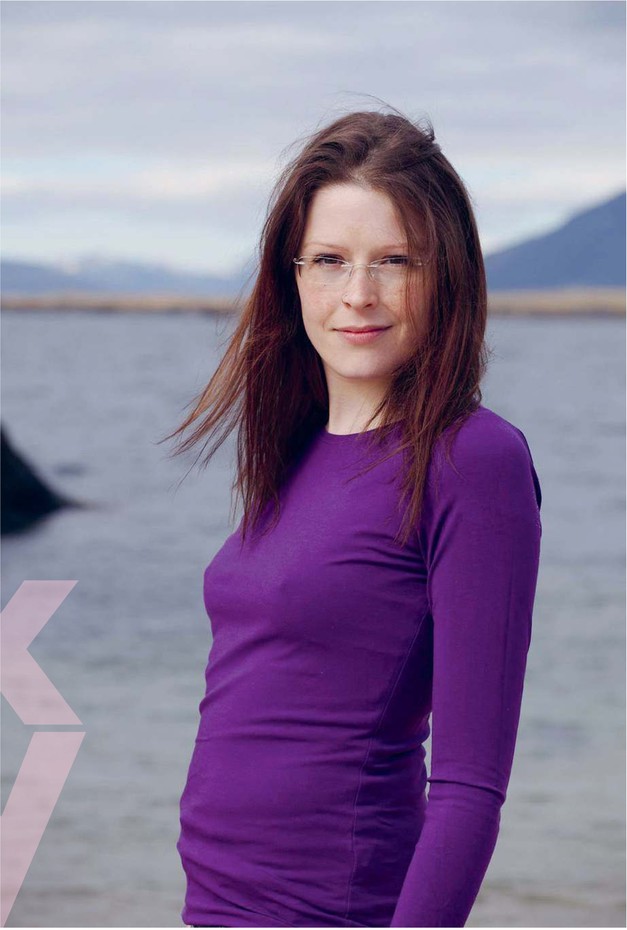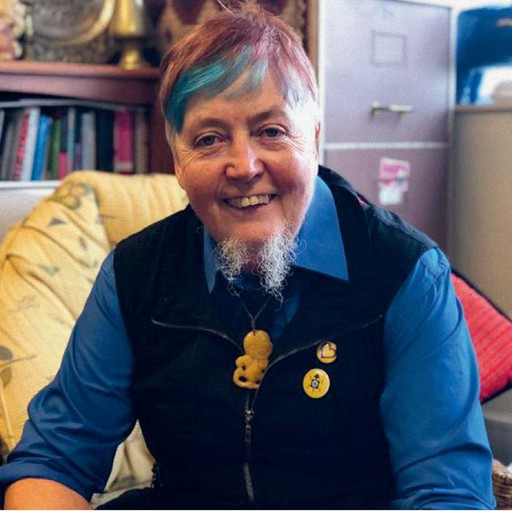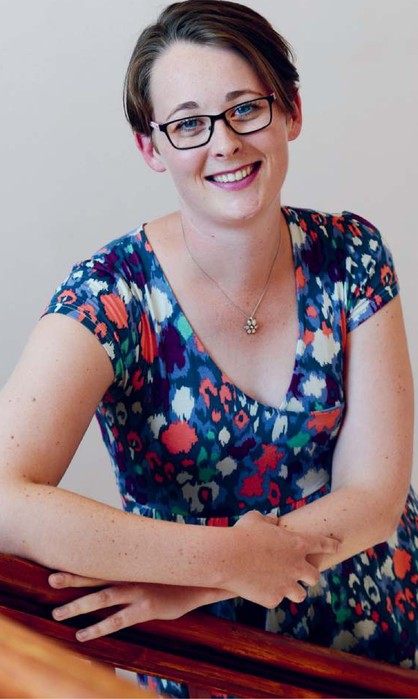Intersex Education
Earlier this year a UN committee report noted deep concern that ‘medically irreversible and unnecessary sex assignment surgery and other treatments are reportedly performed on intersex children’ in Ireland. Although the numbers of intersex people here are significant, little is known about the issues they face, even within the LGBTI community, as Chris O’Donnell reports.

Kitty Anderson Co-chair of OII Europe Organisation of Intersex International
In 2016, the Programme for Government gave a commitment to a National Youth LGBTI+ strategy, spearheaded by Minister Katherine Zappone. Out of the 3,710 young people who took part in the survey upon which the strategy will be based, only one identifi ed as intersex. This could be due to both stigma and the fact that many people with intersex variations are unaware of them.
Not much is widely circulated about the unique biologies and needs of people in the ‘I’ part of the LGBTI community, and yet it is estimated that intersex variations occur within 1.78% of the population. That’s over 5,000 people, more than the population of Galway city. Nonetheless, rarely has intersex been taken on as an issue or given any signifi cant discussion in the Irish context.
According to Tanya Ní Mhuirthile, Assistant Professor of Law in DCU, “Intersex isn’t something that’s easy to see. It’s not something we can tell by someone when we meet them. You may have someone where that’s apparent at birth, because genitalia are somehow ambiguous, and so those cases are easier to identify. They’re not the vast majority of intersex cases. Intersex development can also take place at puberty, when the body isn’t developing the way one might expect.”
TENI are the only body in Ireland actively campaigning on behalf of Ireland’s intersex population. According to Operations Manager, Gordon Grehan of TENI, the organisation is seeking to have new, more informed recommendations for the upcoming revision of the 2014 Gender Recognition Act. Among their recommendations, says Grehan, is “that the Minister ensure that intersex people are not discriminated against in legislation and that sex characteristics are included in non-discrimination law.” Crucially, another recommendation involves the rights of the child, stating that, “TENI urges the State to end the imposition of non-therapeutic genital normalising surgeries.”
The Fundamental Rights Agency issued a landmark document in 2015, which stated: “although they do not usually face actual health problems, due to their status, intersex people are routinely subjected to medical and surgical treatments – often while very young – to align their physical appearance with either of the binary sexes without their prior and informed consent.” In March 2017, a Committee formed by the UN against discrimination, analysed the current situation in Ireland. They noted deep concern that ‘medically irreversible and unnecessary sex assignment surgery and other treatments are reportedly performed on intersex children.’ This has been likened to a Western version of genital mutilation by many.
As intersex activist Kitty Anderson, co-chair of OII Europe (Organisation of Intersex International), says: “It is core that the medical treatments that are performed on us are discriminatory to us on the grounds of our sex. We do know this is still going on in Ireland. It’s going on, basically, everywhere in Europe. I know of Irish intersex people, but I know that nearly none of them are out as being intersex. Ireland is a small community, so coming out is much more diffi cult than in a larger community.’
Anderson continues to explain the complexities around coming out as intersex: “For intersex people, you could say, there is less of an upside to coming out. You’re coming out about what your body is like, and you might be in a relationship. Your partner might know. So you are living with the gender you identify with, and there isn’t really this sort of push to come out. That’s a factor that makes it more diffi cult I think for a lot of intersex people to come out.’
Then, of course, there is the LGBTI umbrella under which intersex issues are often considered. I spoke with Mani B Mitchell, an intersex activist who has been campaigning tirelessly for the past 25 years for intersex rights. They were a pioneer in the initial stirrings of a powerful movement of intersex activists in challenging the medical community on the grounds that standard practice was harmful and traumatic.
“These days I would see myself as a queer person,” says Mitchell. “I see myself as a non-binary person, and I’m also intersexed. My pathway to coming out was through the rainbow, so my fi rst identity, trying to make sense of my experience, was as a lesbian, and I came out in my late teens. So I’ve been part of the activist community all my life.”
“ If a medical professional can’t tell me the accurate truth about my diagnosis, then what are society’s beliefs and opinions around me as a human?

Mani B Mitchell Intersex activist
Mitchell is adamant about their personal connection between the LGBT community and the I community. “I think that the connection for our community is very strong and substantial, and we stand, all of us, I believe, beside the rest of the LGBT community against prejudice, discrimination, marginalisation, homophobia, and transphobia. To me these things are deeply woven together, but I know that there are intersex people who feel that it’s not appropriate to have the I in the growing LGBT acronym. I’ve cut my teeth in LGBT activism, but I respect absolutely that that’s not where everybody feels comfortable.”
It’s important to note that gender identity and sexual orientation are separate to intersex, as intersex has largely to do with biology and variations in sex characteristics. As Anderson reminds us: “When it comes to the core issues that the communities are facing, we need to be careful not to pretend that the issues of just one community can cover the entirety of issues faced by the LGBTI community. When it comes to trans and intersex people it’s often more to do with the medical field, than, for example, family rights.”
People with intersex variations often also experience shame around their bodies, as it is common for doctors to instruct parents not to tell the child they have this variation until their teenage years. As pointed out by intersex youth activist Georgia Andrews, who is co-chair of Intersex Trust Aotearoa New Zealand, this can result in psychological scarring for the intersex person, which constitutes a form of abuse. She goes on to point out that “a lot of people are told that they can’t talk about their diagnosis. As for me, my parents were told ‘don’t tell anyone about this. Don’t talk to your family about this, or friends about this.’ My parents were also told ‘don’t talk to Georgia about this. If you talk to her about it she will become a radical flag-waving activist who will be ostracised by the local communities.
“I’m still processing that today as a 25 year old. There’s been no offering of counselling, no support services offered to my parents; we haven’t been connected with any intersex families. There are lies being told to people as well, which has a massive implication on mental health. For me, I was born with Swyer Syndrome, but I didn’t find out I had XY chromosomes until two years ago. That had a massive impact on my mental health.
“I feel like the way in which my diagnosis was shadowed from me, as well as not being aware that my parents shouldn’t talk about me being intersex, was personal information about me: about my body. I had the right to be told I had XY stereotypical male chromosomes.”
Andrews begs the question that many people with intersex variations can face: “If a medical professional can’t tell me the accurate truth about my diagnosis, then what are society’s beliefs and opinions around me as a human?”
According to Kitty Anderson, “Now we are seeing that intersex people are not coming out publicly, but at least realising they have rights. What is needed is a top-down approach. It is the duty of authoritative bodies and legislators to lay the groundwork for tackling intersex issues. It can’t be left to activists alone.”
Mitchell, who works as a therapist and clinical supervisor, adds that “one of the things that drives my work is respect for a peaceful narrative. And we need safe places where we can sit down and talk about these quite challenging, deep, complex issues.”

Georgia Andrews Co-chair of Intersex Trust Aotearoa New Zealand
Intersex issues need to be widely circulated and permeated into best guidelines for medical practice around people with intersex variations, especially considering psychosocial and physical eff ects of treatment. And, as Mitchell importantly points out, we need safe spaces for Irish people from the intersex community to “come together and share stories; to celebrate their unique biology and begin to structure a shared narrative around intersex in an Irish context. Certainly, the revision of the Gender Recognition Act provides a good opportunity for the state apparatus to better accommodate, inform, and put an end to medical malpractice”.
I asked each person with an intersex variation that I interviewed if they had a message for allies and people from their own community reading this piece. Kitty Anderson stressed approaching intersex people respectfully, and the importance of educating oneself on intersex issues. Georgia Andrews seconded this, and added that it is important for intersex people to be heard and for their personal stories to be considered – most certainly not to impose ill-informed or preconceived ideas of what intersex is on anyone. She also added that “no one intersex person can speak on behalf of all intersex people”.
Mani B Mitchell had an address especially for the people with intersex variations reading this article: “You’re extraordinary. And wonderful. You may have swallowed society’s shame and fear, but there is nothing to be ashamed about. So consider reaching out to this extraordinary intersex family and fi nd your place.”
If you identify as intersex you can fi nd support at www.teni.ie